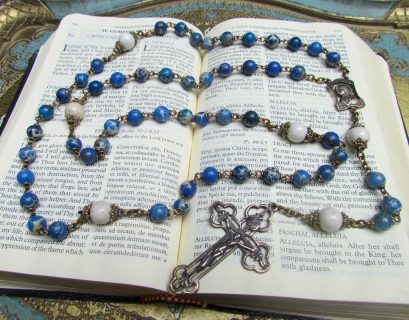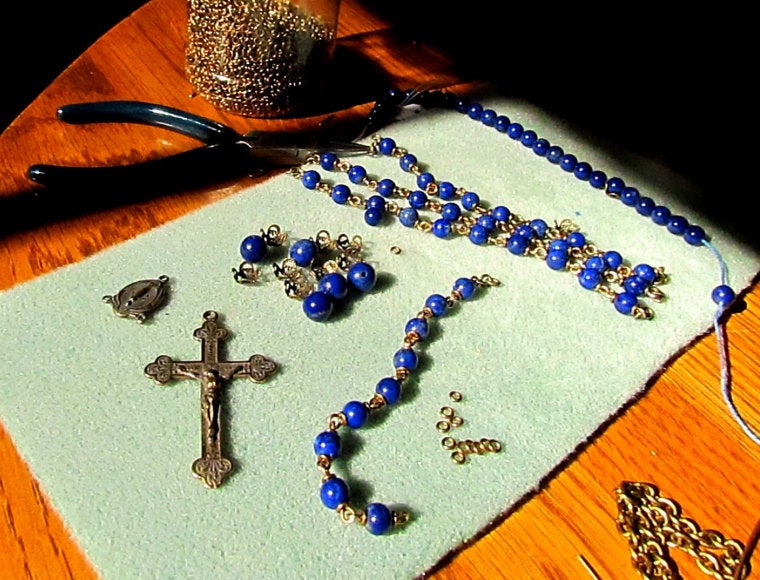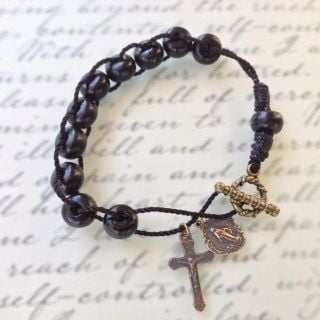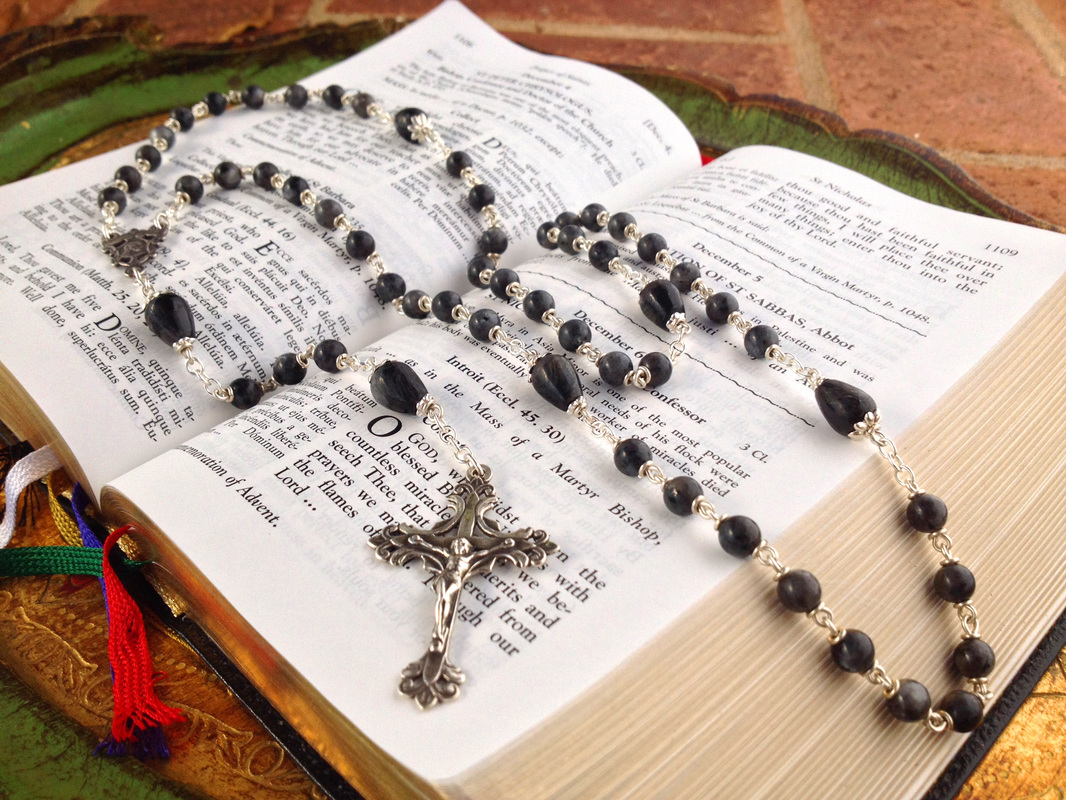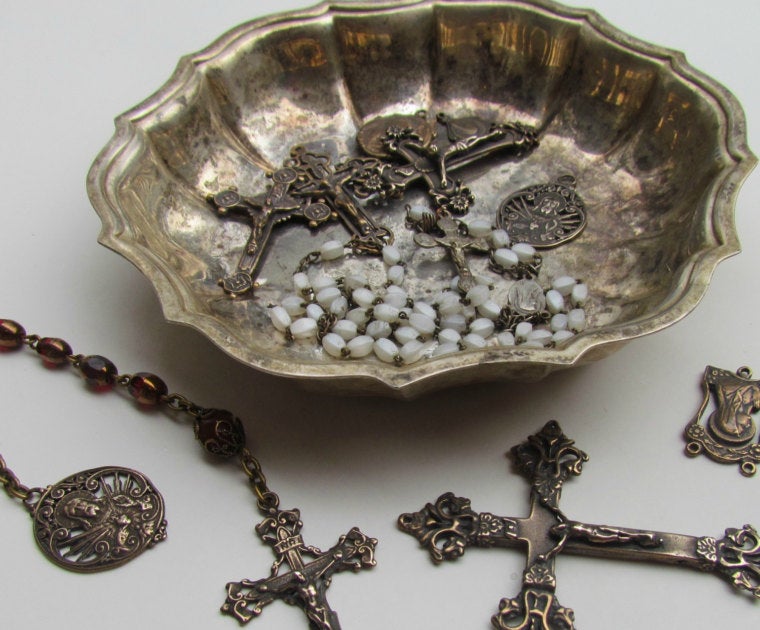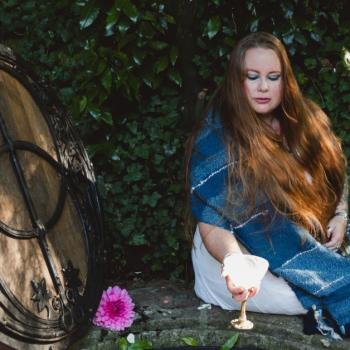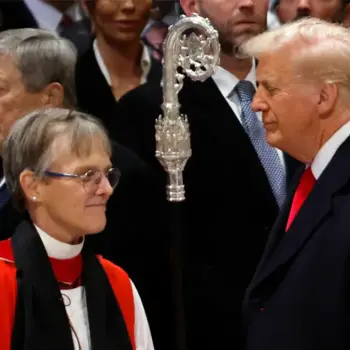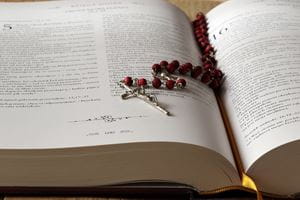
Religion Behind the Scenes spotlights the less discussed, but no less crucial, tasks that keep religious communities running, and the people who make it all happen.
Numerous religions use beads as a means of keeping track of prayers offered or mantras recited. This practice is present in the Baháʼí tradition, Buddhism, Episcopalianism, Hinduism, Islam, Roman Catholicism, and Shinto—among other faith traditions. The use of prayer beads is a practice that is centuries old.
The term “rosary” has reference to both a set of specific prayers said in proper sequence, and the string of beads used to keep track of those prayers. Of the various Christian denominations, Catholics are the most prone to use rosary beads when saying their prayers—specifically the set of prayers known as The Rosary.
In this touching interview, Mary Mulloy—of Graceful Rosaries—tells us about her inspired journey into making rosaries. She shares how she got into this sacred work, but also stories of how God’s hand has been manifested in her life and in her work—a work foundational for Roman Catholic practice.
A lot of people who might read this may not be Roman Catholic. So, could you describe what a rosary is, and how they are used in the Catholic tradition?
Sure! The interesting thing is, I’ve had a lot of people who have bought rosaries over the years who I could tell were not Catholic. And so, people buy them for different reasons. But the term “Rosary” refers to a series of prayers recited, and the string of beads used to count or keep track of those prayers.
The history of rosary beads goes back to St. Dominic (AD 1170-1221). While the prayers said pre-date Dominic, he really set The Rosary, encouraging people to pray it. I’ve heard that the 150 Hail Marys (or Ave Marias) of the original Rosary came from the Psalms—that it was a way of praying the Psalms. So, you meditate on the mysteries as you say these very repetitive prayers—the Hail Mary (Luke 1:28), the Our Father (Matthew 6:9-13); which many don’t realize are prayers drawn from the Bible. So, you meditate on the life of our Lord as you pray, and there's a lot of powerful benefits from praying The Rosary—at least I believe that. And I find that it brings a person peace. It makes me very happy when I see the difference that it makes in lives of my customers and my own family. So, I'm very dedicated to The Rosary.
How long have you been making rosaries?
It’s been about twelve years now. I started making rosaries when I was expecting my seventh child. I had to ask myself, “What are you doing? Like why?” And I thought, “No, I'll just buy a few beads. They'll be in a little box. It'll be contained. I'll start making rosaries, and once the baby gets to be at an age where he's a toddler and getting into things, then I'll put it all away and it'll be fine.” But then I had this premonition like, this is bigger than you think.
The interesting thing is that I do think that these things are directed by, you know, higher powers. So, for example, my baby ended up being a very independent child, who just did his own thing. He never messed with my beads. I could have beads all over the table and he just never messed with them like my other children would have done.
How did you get into this business, and has it done well?
Yes, it has done well. I always have rosaries to make, though it's never like out of control. And I do have friends that come over and help me, you know, organize things, and do what they can do to help. But there's the nitty gritty of the business, and I really do most of that. I don't farm out much.
I'll be honest with you; I felt a calling to make rosaries since I was a little girl. We would pray The Rosary as a family, and I just always had these crummy rosaries. And I remember thinking, “Why are there not more beautiful rosaries?” I’m sure they were out there but, as a little kid, I didn’t see them. And then, as an adult, I had an even stronger desire to make them because I now had my own children. They were making their sacraments, their First Communion, and I tried to go out and buy them a nice rosary. I just wasn’t impressed by what was offered. And so, I would have to settle for something, and they would break so easily. It was just disappointing.
So, once I started making them, it was something that really pulled me in like a magnet—like a very strong magnet. Of course, I needed to fund this craft. You know, the buying of stuff gets expensive very quickly. And having a lot of kids, I just wasn't going to be spending a lot of money unless I was bringing money in. I started telling myself “If you build it, they will come.” And they did. So, that's really how I started making rosaries. It was first for my family, and then—as soon as I started offering them for sale—they started selling right away.
On average, how long does it take to make a rosary?
Well, it really varies. I would say it takes about 30-45 minutes to string one. Often, though, I end up stringing them twice, because I'll make some kind of mistake inside the configuration—because there's a lot of beads, spacer beads and Hail Mary beads—and they have to be strung in a specific order. So, it takes just about an hour on a basic rosary. But the heirloom rosaries probably take me around four hours to make, because it's very intense work. But the nice thing is, I can take them everywhere; I'll take a box of beads to the dentist or to the poolside with my children. I’ve even made them in the airport, and people will come up and say, “What are you doing?” So yeah, I'm kind of a rosary person. And my kids die because I wear these really ugly jeweler things that magnify and they're so embarrassed by me, since they would never go out in public like that.
Have you had any unusual or interesting experiences related to what you do that you would be comfortable sharing with our readers?
Yeah, here’s one. There was a very young man, I believe he was college age. And he asked me to make him a rosary tenner, which is a one-decade rosary. And I could just tell through our emails that he was a very prayerful person. And then he wrote back, sometime later, and he said, “I'd like to have one for my girlfriend.” And so, I made one. Well, so then, a few months went by, and he requested that I make an Aquamarine sterling silver rosary for his grandmother's birthday. I was like, “Oh, my goodness, these people are important to him. And this prayer is important for him.” So, I never really forgot him. His name was Ryan. Well, years later, out of the blue, I get this email from his mother. And she said that her son had died in a car accident, and she had found my rosary tenner in his pocket. And this really struck me, you know? He lived a very short life, but he was very prayerful; and to know that the rosary I made him was important to him and was a help to him on his journey to salvation… It just really hit me. You suddenly realize that its importance is much bigger than you. It’s a small work, but yet I feel like it is a bigger work with results that I will never really know.
But these small little glimpses into the lives of my customers helps. Things like this happen, and you really do feel a part of people's lives. It’s like one of the best businesses you can have because there’s always good things happening.
I'll share another experience. Usually, when I’m making a rosary, I just sort of decide the design and then I make it. But one time I had some beads that I wanted to use to make a rosary, and I put my head down and really prayed, “God, inspire me to make this rosary well for whoever would be the recipient of it.” The beads were kind of a military blue, so my mind went to a friend and Deacon at our parish, named Paul. He is retired military. I thought, “He’ll be my inspiration. What would he like on this rosary?” So, I made this rosary—not actually for Paul, but with him as my inspiration. But I prayed for Paul while I made this rosary. Again, it wasn't for Paul specifically; it was just inspired by him. I intended to sell it on the internet, but then a fundraiser came up and I quickly went through my workshop looking for things to donate. And this is one of the rosaries I donated, and then I didn’t think any more about it—until I got a phone call. It was Paul. He said to me, “I wanted to tell you that I bought one of your rosaries at a fundraiser.” Then he described it, and I right away realized it was the one I made while thinking about him. I said, “Oh, my gosh, Paul, when I made that rosary, I prayed for you as I made it because the color of the beads made me think of the military and, therefore, you. You were my inspiration behind that one.” That experience made me realize that this is a work that is really not my own. It’s an otherworldly work, and the powers that be, the angels, are inspiring me and those who purchase them. So, that was really very powerful for me.
What aspect of your work are you most proud of?
Well, I certainly take pride in the quality of the rosaries I make; in their strength, the quality of the materials I use, and their beauty. I’ve really searched long and hard for the best possible materials, so that what I make has an heirloom quality about it.
I can’t necessarily take credit for this, but I love the antique reproduction medals that are the center of every rosary I make. It’s exciting to be able to take old treasures and make them come to life again. I love antiquity and the things that connect us to those who came before us. We are all part of the Communion of Saints, and these medals are evidence of both the early artisans and the faithful individuals who carried them for inspiration. The vintage character that these medals and parts lend to my rosaries elevates the look from the ordinary to the extraordinary. I am not wishing to take any credit for these beautiful rosary parts and medals. I am blessed to partner with the artisans of days gone by and feature them as components in my work.
Is there a role of priests in what you do, blessing, approving the design, or anything like that?
Well, the overarching design of the rosary goes way back in Catholic tradition. So, that's not really something I design. Its pretty standard.
I don't bless my rosaries, because blessing is a dedication for purpose. Once it is blessed, the rosary becomes a sacramental, and we're not supposed to sell blessed objects, because we can't sell a blessing. So, each individual who buys my rosaries can have their priest bless them. Then they become a sacramental, and then the faith of the person who is praying The Rosary brings about grace. It’s not that the beads themselves have any means of bringing grace. It would be superstitious to think that beads have power themselves. But you sanctify them by asking for God's blessing on them, and then God can use them to transfer grace to you, and that's based on your own faith. So, if someone was to take one of my rosaries, and have no belief in reciting The Rosary, then it wouldn't do anything for them—because they didn't have any faith in what they were doing. So, you know, the prayers themselves are what bring you the grace. The prayers and your faith.
Are there ways in which making rosaries has changed you for the better or influenced you spiritually?
Yeah, definitely. I've been more devoted to prayer, and I think I've influenced my family to be more prayerful as well. It kind of surprises me to see a teenager who prays The Rosary every day and asks me if I'll pray The Rosary with him. So, I'm influenced by my family's devotion and find I’m more devoted as well.
Also, when you're doing this kind of work, and you offer it to God, and you're doing it out of love for God, then I think it's more grace-filled work, which is why my rosaries are called “graceful rosaries.” I do feel like there's so much grace involved with the work. And I hope it has made me a better person. I think it has. I will know at the end of my life whether I truly took advantage of all of the graces that I was being offered; but I do think that it has made me a better person and I definitely do think that it's made me more powerful.
Are you seeing an evolution in the making of rosaries where, 10-15 years down the road, there is going to be a different process than there is now?
I think there is. There's always some evolution, like new chaplets for new saints, or whatever it may be. But I feel like I'm part of the evolution as well. I use different supplies and my own designs. So, for example, there's a piece that I kind of developed, which comes from St. Thérèse. She used to have a “sacrifice bead,” where she would push a bead for each sacrifice she had made. And I always thought that was really very beautiful. And so, when my kids were little, we would make these little sacrifice beads. Well, I took the concept where you interweave these chords between the beads so that they will stay in place when you move them, and I transformed it so that it would be a bracelet. And that's something that I think is maybe newer in the whole idea of rosary bracelets. It's probably my biggest selling item, just because it makes such a nice gift.
I think that, as materials change or as people get different ideas of how they will use them, there will be slight changes in the use and style of rosaries; but there’s sort of a sameness that will always be there. The prayers of The Rosary will remain the same, but there will likely be new techniques and new materials.
I would just add that a rosary isn’t just something to use when saying your prayers. It is a keepsake; something you can pass down to your children and grandchildren. Receiving something like that can remind them of the faith of their parent or grandparent. A quality rosary will last for many years and be something you can pass down. My family still have their very first rosaries that I made for them.
Is there anything else you would like to share about your work of making rosaries?
I really do feel that there was a calling to it. But there were times when I wondered or second guessed myself, and thought, you know, “What am I doing? Why do I have this business when I already have a busy life as a mother?” And then, out of the blue, I’ll have an experience like this one, where I’m thinking those thoughts and then I get this email from a customer who says to me, “This is very strange for me to be writing you, because it's not like I feel like I have God in my pocket, but I feel like I'm supposed to tell you that you need to continue making rosaries.” Now, I’m not a person that looks for signs in my life. It's very, very rare that I ever ask God for a sign. But the timing of that email was definitely a sign for me. I do have things pop up at times when I'm sort of seeking answers, even interiorly. I've had that several times through different instances with The Rosary. And I've had really amazing things happen.
Sometimes this is a really personal work. I could hire somebody to do my customer service and all of that. But it's almost like I want the whole work to be personal to me because, when I write my customers and they're specifically asking me to make something unique for them, there is a connection that’s made between us, particularly when I find out the difference that the rosary made in their life.
Interview conducted, transcribed, edited, and condensed by Alonzo L. Gaskill.
ABOUT ALONZO L. GASKILL, PH.D.
Alonzo L. Gaskill is an author, editor, theologian, lecturer, and professor of World Religions. He holds degrees in philosophy, theology/comparative religion, and biblical studies. He has authored more than two-dozen books and numerous articles on various aspects of religion; with topics ranging from world religions and interfaith dialogue, to scriptural commentaries, texts on symbolism, sacred space, and ritual, and even devotional literature.
12/1/2022 6:45:39 PM
